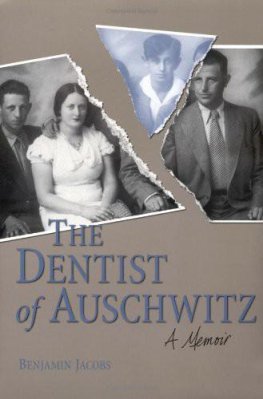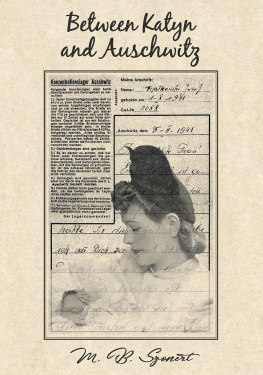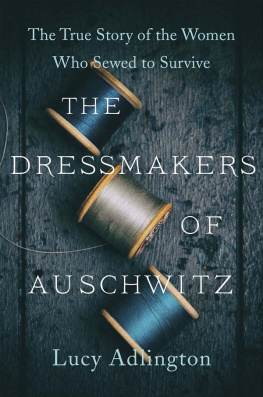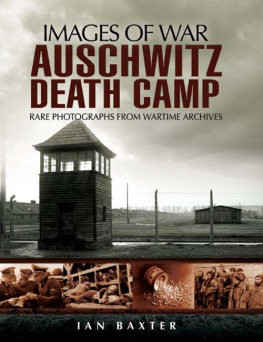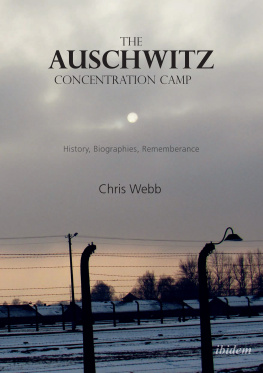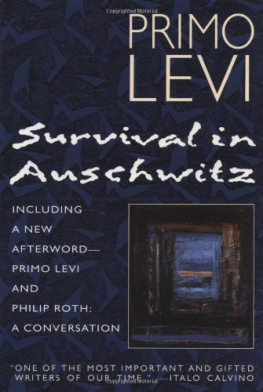Copy editor: Jadwiga Pinderska-Lech
Proofreading: Beata Kos
Cover design: Mariusz Banachowicz
Typesetting: Nadiya Ivanets
Photographs and documents:
The Archives of the Auschwitz-Birkenau State Museum in Owicim
Front cover: Auschwitz I Camp Director Karl Fritzschs children with their nanny, Emilia elazny
Copyright by Auschwitz-Birkenau State Museum, 2014
ISBN: 978-83-7704-075-1
Ebook:

konwersja.virtualo.pl
Table of contents
SS-Unterscharfhrer Martin Fresemann.
An account by Janina Linkiewicz, age 14
SS-Obersturmfhrer Dr. Wilhelm Frank.
An account by Alfreda Babiuch
SS-Untersturmfhrer Dr. Werner Rohde, SS-Unterscharfhrer Rudolf Wntz.
An account by Prakseda Witek, age 14
SS-Hauptsturmfhrer Karl Fritzsch.
An account by Emilia elazny, age 19
SS-Sturmbannfhrer Karl Bischoff.
An account by Maria Pawela, age 18
SS-Unterscharfhrer Scholz, SS-Mann Bauman.
An account by Weronika Chory, age 14
Johann Schmidt.
An account by Janina Chodorowska, age 14
SS-Hauptscharfhrer Gerhard Palitzsch.
An account by Helena Kys, age 19
SS-Oberscharfhrer Demetrius Kalaus.
An account by Bogusawa Gowacka, age 14
SS-Obersturmfhrer Wolfgang Gssgen.
An account by Danuta Rzempiel, age 16
SS-Unterscharfhrer Erich Rnisch, SS-Obersturmfhrer Roland Albert.
An account by Halina Lekacz, age 14
SS-Hauptsturmfhrer Horst Fischer.
An account by Aleksandra Stawarczyk, age 14
SS-Oberscharfhrer Wilhelm Emmerich.
An account by Wadysawa Biegun, age 14
SS-Unterscharfhrer Helmut Schild.
An account by Wadysawa Jastrzbska, age 14
SS-Hauptscharfhrer Werner Hndler.
An account by Maria Baran, age 16
SS-Obersturmbannfhrer Rudolf Hss.
An account by Janina Szczurek, age 32
SS-Obersturmbannfhrer Rudolf Hss.
An account by Aniela Bednarska, age 47
SS-Obersturmbannfhrer Rudolf Hss.
An account by former prisoner Stanisaw Dubiel, age 30
SS-Sturmbannfhrer Willi Burger, Ss-obersturmbannfhrer Karl Mckel.
An account by former prisoner Elza Abt, age 28
After the war, as historians attempted to understand the reasons for the exceptionally brutal behavior of SS men toward concentration camp prisoners, they put forward the most varied causes. Above all, there was the prolonged ideological training, the Dachau Eicke school of brainwashing, that extirpated all human emotions and inculcated hatred for the enemies of the Reich. Furthermore, historians argued, SS men in the concentration camp garrisons were not required to be particularly intelligent. These hypotheses were supported almost exclusively by excerpts from testimony by the SS men themselves, or by concentration camp prisoners, in the transcripts of the trials in the late 1940s. Later, in the mid-1960s, approximately the same opinions were formulated on the basis of testimony at the Frankfurt trials.
Discussions of the subject were revived after the publication of the well-known book by Daniel Goldhagen, the highly charged discussion in the press once again made it plain that there is a considerable degree of public interest in the subject, and in explaining the reasons why so many apparently ordinary Germans jettisoned clear moral norms and became brutes and criminals.
Further research in this direction yielded fairly promising results; nevertheless, it continued to be based on two main types of sources: statements by prisoners who survived the concentration camps, and testimony by SS men who belonged to the garrisons of those camps. The selective use of these sources to confirm a priori hypothesesin search of impressive quotations or to show off ones eruditionsometimes led the authors of these studies astray.
So it is that, along with the numerous insightful observations in Wolfgang Sofskis popular works,
There very well may have been such an idea, but it came to nothing in confrontation with the realities of life and service in the concentration camps. As we know from other accounts, the officers had no opportunity to attain authority over their subordinates by standing out in combat, and tried instead to acquire it by applying the harsh, tried-and-true form of Prussian drillmaking their subordinates stand at attention on any and all pretextsand also by distinguishing themselves from the NCOs by their spit-shined boots, pressed trousers, and so on. Almost from the beginning of Auschwitz, NCOs ate in the kitchen barracks while the luxuriously furnished rooms of the SS-Fhrerheim were designated for the officers. Evening icebreakers featuring sausages and beer were indeed held for all ranks of the camp SS (Kameradschaften ), but the officers who attended only waited for a moment when they could discreetly slip away and go home. As a causal factor in the brutality shown to prisoners in Auschwitz, the concept of relaxed discipline in the SS is therefore inaccurate.
Furthermore, Sofsky overrates the impact of the administrative division of the camp into departments, which supposedly generated interdepartmental conflicts;
Without going too deeply into this kind of investigation, it is worth noting that the ambiguity of the source material is often an important obstacle to obtaining a clear image of the relations among the SS men in Auschwitz. In their postwar testimony (which accounts for most of the documentation at our disposal) the SS men try to portray themselves in the most favorable light; former prisoners, on the other hand, paint them almost exclusively in dark colors. For instance, SS men maintained that in general they were not to blame for anything and did nothing wrong while they were at Auschwitz. They left their quarters for work in the morning, packing their lunches in their briefcases, and then spent the day at the office before returning home to their wives and children in the afternoon. Former prisoners, in contrast, tended, as was justifiable in the circumstances, to attach blame in an equal degree to all or almost all the SS men they described in their accounts. In the search for the objective truth and disposing of material so difficult to assess, the historian willingly turns to accounts by third parties who were not so emotionally engaged in the events in question.
In 1974 Maria Jdrysik, who worked in the research department of the State Museum in Owicim, interviewed women who, as young girls, had been assigned during the war to work in the homes of SS officers and NCOs from the Auschwitz garrison.
Under the laws in force at the time, young people were obliged from the time they turned 14 to take any job specified by the occupation authorities. Girls this age were thus assigned to the families of local Germans, above all SS officers and NCOs from the camp garrison. They did the washing, cooking, and shopping, scrubbed the floors, and looked after the children. The ladies of the house usually regarded it as obvious that these little Polish girls should do the boring, unrewarding everyday tasks. Some treated them badly and others with grudging decency, while others still developed something like an attachment to them over time and gave them small presents, second-hand dresses, or a pair of shoes.
Although these girls were still very young and in some cases rather nave, they were acute observers of the family lives and interpersonal relations in the homes of their employers. Being Poles, they all had an attitude of aversion or hostility to Germans. However, because they did not see how the breadwinners behaved in the camp or treated the prisoners there, they could not become more strongly prejudiced against them. All the more so, therefore, the image of the behind-the-scenes life of the SS men and their families that emerges from the accounts by the Polish girls can be regarded as objective and approximating reality.


